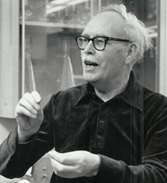Background

Stanley Dagley was Regents Professor of Biochemistry at the University of Minnesota. Known for his luminary teaching, Professor Dagley was also highly regarded for his research on microbial oxidation reactions. Dagley first studied microbial biochemistry from a thermodynamics standpoint with Chemistry Nobel Laureate Sir Cyril Hinshelwood at Oxford. He started his professorial career at the University of Leeds prior to his distinguished tenure at the University of Minnesota.
Professor Stanley Dagley inspired a legion of scientists to investigate novel and exotic microbial biochemistry using simple, but elegant, biochemical logic. Some of those he inspired have initiated the Stanley Dagley Lectureship.
Stanley Dagley, Regents Professor of Biochemistry, BMBB faculty 1970-1987
2022: Dr. Daniel Herschlag
From structure-function to ensemble-function: A needed paradigm shift
- Professor of Biochemistry
- Stanford University; Stanford, California
2021: Dr. David R. Liu
Base Editing and Prime Editing: GenomeEditing Without Double-Strand Breaks
- Professor of Chemistry and Chemical Biology
- Harvard University; Boston, MA
- Title: Base Editing and Prime Editing: GenomeEditing Without Double-Strand Breaks
2020: Dr. Jon Clardy
Chasing Molecules and Mechanisms in the Gut Microbiome
- Harvard Medical School
- Hsien Wu and Daisy Yen Wu Professor of Biological Chemistry and Molecular Pharmacology
Archive
|
Year |
Speaker/Affiliation |
Title |
| 2019 |
Dr. Craig A. Townsend Johns Hopkins University, Baltimore, MD |
New Insights into Enediyne Antitumor Antibiotic Biosynthesis |
| 2018 |
Dr. Patricia C. Babbitt Professor of Bioengineering & Therapeutic Science University of California-San Francisco, San Francisco, CA |
Evolution of new enzymes from privileged ancestral scaffolds |
| 2017 |
Dr. Andrew D. Ellington Fraser Professor of Biochemistry, Center for Systems and Synthetic Biology, University of Texas at Austin, Austin, TX |
Feedback loops in directed evolution |
| 2016 |
Dr. Christina Smolke Professor of Bioengineering, Schools of Engineering & Medicine, Stanford University, Stanford, CA |
Synthetic biology platforms for natural product biosynthesis and discovery |
| 2015 |
Dr. Donald Hilvert Professor of Chemistry, Swiss Federal Institute of Technology Zürich (ETH), Swizerland |
Nearer to nature: design and optimization of artificial enzymes Self-assembling, subercharged protein containers |
|
2014 |
Dr. Pamela Silver |
Biology is the technology of this century Designing biological systems for health and sustainability |
|
2013 |
Dr. Dan S. Tawfik |
Promiscuity, noise and the divergence of new protein functions The ongoing expansion of protein sequence space |
|
2012 |
Dr. Frances H. Arnold (Nobel Laureate) Dick and Barbara Dickinson Professor of Chemical Engineering, Bioengineering & Biochemistry, California Institute of Technology
|
Design by evolution: engineering biology in the 21st century Enzyme engineering by structure-guided recombination |
|
2011 |
Dr. Jack Szostak (Nobel Laureate) |
The Origin of Cellular Life Towards Self-Replicating Genetic Polymers |
|
2010 |
Dr. John Roth |
A molecular view of natural selection: Understanding high-speed adaptation. Pathways of genetic change: Three stories about gene copy number changes. |
|
2008 |
Dr. Stephen Withers |
Sugars are good for you: their roles as therapeutics. Engineering and evolution of old enzymes for new tasks: glycoside assembly. |
|
2007 |
Dr. Gregory A. Petsko |
Structural Enzymology in Four Dimensions: Time-Resolved Crystal Structures of Enzymes At Work. The Next Epidemic: What Happens To Your Brain As You Get Older and What We're Trying To Do About It. |
|
2006 |
Dr. Peter G. Schultz |
An expanding genetic code. Synthesis at the interface of chemistry and biology. |
|
2005 |
Dr. Perry Frey |
A story of hydrogen bonding: The low-barrier hydrogen bond in chymotrypsin. Science and Antiscience. |
|
2004 |
Sir David Hopwood |
The discovery and development of antibiotics. Using Streptomyces genes to make new antibiotics. |
|
2003 |
Dr. Rolf Thauer |
On Methanogens and Methanotrophs. Biochemistry of Methanogenesis. |
|
2002 |
Dr. Arthur Kornberg (Nobel Laureate) |
Reflections on DNA Replication and Current Studies on Inorganic Polyphosphate. Biotechnology: Academia and/or Business. |
|
2001 |
Dr. Daniel Koshland, Jr. |
Propagation of Conformational Changes in Receptors and Enzymes. Scientific Advances: What Will We be Able To Do and What Will We Be Allowed To Do? |